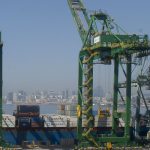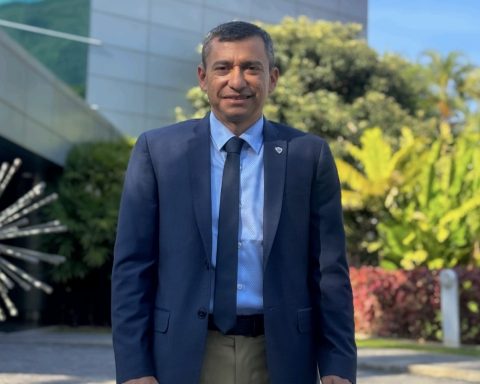h
a little over 23 years ago, On February 21, 2000, the journalist and writer Fernando Benítez passed away. Due to the importance, topicality and relevance of his work, just a few days ago he was honored in Fine Arts.
Author of more than 30 books of different genres, some of which are obligatory references on the history or the ethnic question in Mexico, Benítez wrote one, relatively little known, published by Cuadernos Americanos, which has become increasingly topical over the years: china in sight. Travel diary elaborated with magnificent prose, narrates his journey of more than 100 days, 150 thousand kilometers and some 200 flight hours in 1952, to cross to the other side of the Iron courtainand explain how China Popular, with barely three years of independent life at that time, was Gulliver, passing from Lilliput to the land of giants
.
Benítez traveled to Mao Tse-tung’s homeland, between September 13 (when he left Mexico City) and December 28 (the date he took the plane in Prague to return to his country), as part of the Mexican delegation that attended the Asia-Pacific Regions Peace Conference. They were part of it, among others, Dr. Ismael Cosío Villegas (years later in solidarity with the movement of the white coats of 1965 and the student-popular movement of 1968); the writer Rafael López Malo; the archaeologist Eulalia Guzmán; Mireya Huerta; the journalist Ernesto Álvarez Nolasco, and the labor leader Felipe Sánchez Acevedo.
In the Far East, the author of Creole life in the 16th century He lived closely an agrarian reform, based more on the conscience of the peasants than on the law. He was in Beijing, Shanghai, Hanchow, Manchuria, villages and camps. He observed great works to tame the Huai River. He went to large factories that produced machinery and talked with the workers. He attended the most beautiful artistic shows.
The experience had a profound impact on him. The first three months after his arrival in Mexico he spent talking non-stop about what he had seen, until fatigue forced him to stop. Career, leaning on the notes taken on his knees, he gave shape to china in sight between May and September 1953.
The book, according to the review (sent to me by Jaime Ortega) in the Voice of Mexico, written by the philosopher Joaquín Sánchez Macgrégor, a member of the Grupo Hiperión and leader of the Communist Youth, is a work of high democratic flights, one of the Very rare in postwar Mexican literature. And, according to another by the poet Enrique González Rojo, which appeared in the University Magazinereports the birth of a social regime with a different planning, with a new spirit
of a new country that he sees with the eyes of sensitivity and emotion.
Despite the distance and cultural differences, Benítez feels at home in the Asian nation. “For us Mexicans, being in China meant retying the old bond that had kept us united, for centuries, to the Far East,” he writes. The Mexican does not feel like a foreigner in China. China is perhaps ours because we Orientals, Africans, and Latin Americans belong to the ‘world’, to everything that is not the West, to humanity that has lived on the margins of Western culture. Mexico, as a nation, naturally leans into the orbit of the Orientals.”
He finds, fascinated, that what makes China great, the small and firm hands of its artists and peasants, is also what gives Mexico its strength and coherence.
Impacted by the Chinese experience and the national liberation movements in Vietnam and Malaysia, anticipating what was the signing of the 10 Bandung principles, which would give rise to the formation of the Non-Aligned Movement in 1961, the author of The route of Hernán Cortés assures: We are facing a historical fact of incalculable consequences: the rebellion of the colonial peoples
.
According to him, the basis of this event is found in the fact that Poverty is not what inclines men to communism, but the awareness that capitalism is not capable of solving their problems. Americans, English, French and Dutch are determined to maintain their political and economic hegemony by force.
.
In a phrase that could have been enunciated many years later by some member of liberation theology, he sentences: To those who believe they have their monopoly, we must tell them that if Christ is anywhere today, he is with the Mexican, Chinese or Vietnamese peasants, on the side of those who hunger and thirst for justice, on the side of those who desire peace. and love man and try to elevate him in the light of well-being and knowledge
.
On September 30, the writer looked at Mao Tse-tung from five meters away, the organizing brain of a new political system tending to give power to the peasants and seek the support of the people
. Benítez considered him an admirable poet. He was impressed by his solidity, his clear forehead, his short black hair, his wide face in which serenity and sweetness were mixed, his full and kind face. He was he, he wrote he, a man without vices, simple. In him a Western system of thought, Marxism and a poetic feeling of the purest Chinese lineage blended harmoniously. He was an orderly and clear speaker and thinker; the means to realize the aspirations of his people
.
china in sight It is the testimony of a great historical moment. From a time when the colossus stood up and felt how within it there was joy and the strength to save the world. It is enough to look at what the People’s Republic of China is today to see how accurate some of Fernando Benítez’s predictions turned out. Hopefully, very soon, his book will be published again. Doing so would honor his memory.
Twitter: @lhan55














